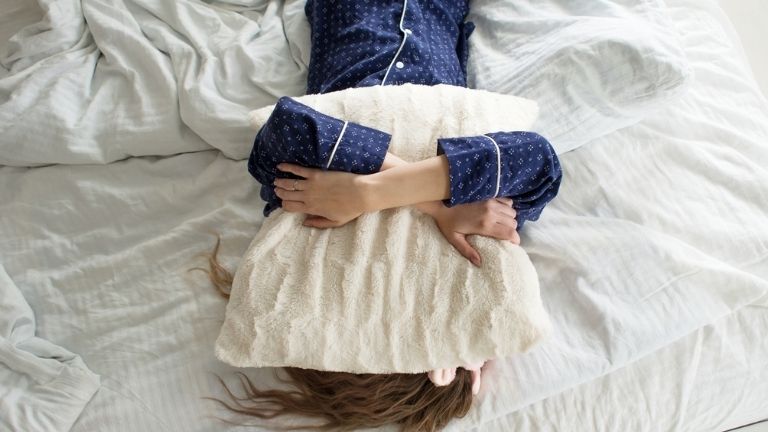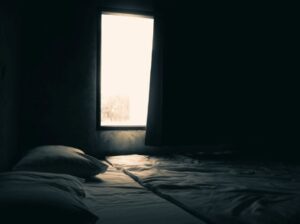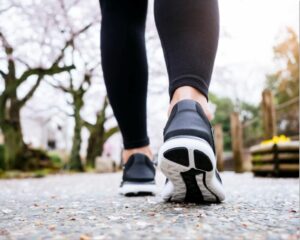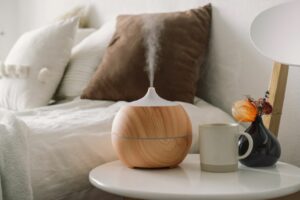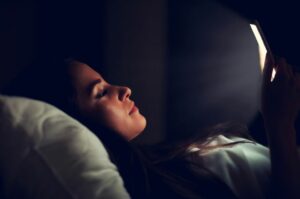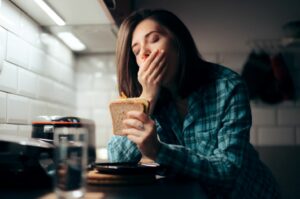Tired all the time? Frequent sleep struggler Charlotte Dormon reveals seven of the best tried and tested strategies to improve your snooze
If you’re fed up with feeling tired all the time, you’re not the only one…
Almost one in five people in the UK struggle to fall asleep every night, which results in feeling tired both mentally and physically.
Whether it’s a racing mind preventing you from falling asleep or waking too frequently at night – many of us seem to suffer ongoing sleep struggles.
Sleep deprivation plays havoc with everything from our hormonal health, mood, immunity, focus, and the types of foods we choose to eat – cue a day of carb and sugar cravings anyone?
Healthista Collective Expert Charlotte Dormon, 41 – a busy London career woman, health coach and long-term sufferer of sleep struggles – has spent the last six months seeking out the best natural solutions to help her get some decent quality shuteye.
Here are Charlotte’s tried and tested solutions for helping improve sleep quality…
Mission improve snooze
For most of my life I have found getting a good night’s sleep to be quite the challenge.
As well as being a super light sleeper, I have also spent way too many nights lying awake with a racing mind overthinking about work, relationships and money.
I also seem to have an inbuilt early bird waking system that often causes me to wake up at the crack of dawn – we’re talking 5:30am!
This has played havoc with my sleep success and sadly my overall health has suffered. That’s why finding natural solutions and sleep performance strategies has become quite a critical mission for me.
Here are my top seven snooze improving tips…
#1 Take a break from the booze
I have never in the history of my booze-related socialising life, found my sleep to be any good after drinking alcohol.
From only having vodka and soda, to stopping at certain times of the night and having food, every trick in the book still seems to play havoc with my sleep.
why not try to incorporate some yummy alcohol-free options into your nights out?
I am mostly teetotal these days to resolve these issues, but sometimes there are occasions where I accept that in order to share that bottle of vino over dinner, I fully expect to lie awake hot and bothered at 3am with my heart racing.
I’m not suggesting you to go teetotal, but why not try to incorporate some yummy alcohol-free options into your nights out? These days we are lucky to have many great-tasting alcohol-free drinks to enjoy as an alternative.
Yes, there might be the odd occasion where one too many glasses of champers become part of the night and you end up with a crappy night’s sleep, but opting for some alcohol free drinks here and there can only help matters.
#2 Don’t be scared of the dark
Sleeping in the dark can prevent early waking and mean you get much deeper quality sleep. For sensitive sleepers like me, you need to do whatever you can to block out natural daylight.
It is completely natural to wake up with daylight, as we are programmed to make the hormone cortisol as soon as natural daylight touches our skin – cortisol is a hormone that gets you going and makes you feel more awake and ready for the day to begin.
This of course would be totally fine if we were going to bed when it was dark and waking up with the light, however these days most of us are going to bed much later than our natural body clock would wish us to do so.
do whatever you can to block out natural daylight
Plus, waking up when it’s still dark to go to work can make waking up after a bad nights sleep a nightmare.
Blackout curtains and blackout blinds have been one of the biggest game-changers for improving my sleep quality and the length of time I stay asleep.
I you can’t get professional blinds fitted or are staying somewhere where there are no blackout blinds, you can buy really great temporary ones from Magic Blinds.
Also, I suggest investing in a comfy eye-mask – ideal if you are staying in hotels, or travelling.
#3 Less HITT more walking
The simple, easy and free exercise of ‘walking’ can help you sleep better – great news for those who are not a huge fan of the gym or can’t make time for a fitness class.
As well as being shown to help with fat loss (especially around the middle), walking reduces the pesky stress hormones that can make us feel agitated and unable to relax that causes us to struggle to sleep well at night.
Research has shown that HIIT (high-intensity interval training) in the evening can actually cause sleep struggles. The excess hormones created during this type of exercise – cortisol and adrenaline – can mean we are left feeling wide awake, rather than feeling sleepy.
This type of workout might be okay earlier in the day, but in the evening, this could be a reason why you may find it hard to fall asleep or may wake you up in the night.
walking reduces the pesky stress hormones that can make us feel agitated
After a lot of testing, I found that power walking late can stop me from sleeping, so I would say try and do any walking before 8pm.
If you have no motivation to walk, or want to keep track of your steps and progress, I would say it’s well worth getting a fitness watch.
I chose a Garmin Venu watch to help me stay motivated and aware of my lack of movement from sitting at a desk all day. It also tracks your sleep quality to monitor how much deep rest you have accumulated overnight.
#4 Scent to sleep
Most have heard the wonders of essential oils like lavender to help you feel more relaxed and support sleep. I have tried many pillow mists and oils out there and for me none of them seemed to do the trick.
What did work though was investing in an electronic diffuser to gently atomise the relaxing essential oils around my room.
I put mine next to my bed and relax or read in bed for 20 mins whilst the oils worked their magic.
The diffuser I chose also has a number of relaxing sounds programmed in, so you can pick music and calm-inducing sounds to help you relax too. This is especially helpful for me when my brain is busy with thoughts and churning over my to-do list.
#5 Wear blue blocker glasses and invest in screen protectors
We live in a digital world, where spending time on our screens is a major part of our life, including reading, researching, watching, working and socialising on screens.
Unfortunately, the blue light that comes from our phones, laptops, tablets and televisions, has been shown to majorly disrupt our sleep quality and play havoc with our natural melatonin producing cycle.
In an ideal world, we would all be spending a lot less time on screens, however, this is easier said than done.
It’s all so tempting to just watch one more episode of your favourite show on Netflix, keep swiping for another 15 mins on your dating app, or just carry on working much later to meet that deadline.
you can now get yourself blue blocker glasses to wear when using screens
The good news is you can now get yourself blue blocker glasses to wear when using screens. You can buy blue blocker screen protectors to fit onto your phone and laptops too that have been clinically tested to protect your eyes from the disruptive blue light.
I now have a pair of blue blocker glasses that I wear when on the computer, which has made a huge difference to my headaches.
I also use a medically rated blue blocker screen protector on my iPhone, so I feel less worried about my sleep being hampered if I fancy spending some more time on a screen before bed.
#6 Eat and drink right to sleep tight
Food and drink can play a major role in helping or hindering our sleep.
Most good sleep advice you hear or read about will tell you to not eat to close to bedtime, as your digestive system naturally slows down in the evening into rest mode, rather than work mode.
The earlier the better unless you are doing a job that involves you working late into the evening. I try to eat as early as I can, ideally close to 6:30 or 7pm, to allow my dinner at least three hours before I head to bed at 10pm.
If I am hungry before I go to bed, I will have half a banana or a couple of crackers with a very small amount of nut butter
If I eat too much rich, fatty, or raw foods (salads and raw vegetables) too late in the evening, I find myself waking up with a bad case of bloating and stomach discomfort.
The key thing is to eat foods that are easy to digest, such as slow-cooked stews, as this is far easier for your digestive system to break down and digest.
You can always have a ‘breakfast’ style dinner and have toast with some banana or porridge with some yoghurt and a sprinkle of nuts or even a light sandwich. This is much easier to digest and should be less likely to cause you to bloat through the night.
The other thing to bear in mind is the intake of sugar and refined carbs at night, as this will spike your blood sugar and keep you awake.
Anyone with sleep issues will know that excess caffeine is a no-no, especially after midday. Caffeine can last up to 12 hours in the bloodstream and induces many stress hormones, creating a vicious cycle of feeling wired and tired.
Try drinking green tea for a lower caffeine intake such as Pukka Clean Matcha Green or Clearspring Matcha powder.
#7 Try calming and sleep supportive natural supplements
If you have become reliant on over the counter medication such as sleeping pills, prescription medications for sleep, or even relying on the sedative effects of alcohol to get you off to sleep, it may be time to look at incorporating some more natural supplements into your everyday routine.
Try these natural supplements, that have been a godsend with helping me get some Zzz’s.
CBD
We’ve all heard about the wonders of CBD for stress and anxiety, so it’s no wonder this calming cannabis plant has been well documented for being helpful for those that struggle to fall asleep and stay asleep.
Using a few drops of oil in the evening to support your wind-down routine, as well as just before bed can help you sleep more deeply.
Try a couple of drops of Canamis 1000 strength CBD oil under your tongue an hour before you head to bed to help you feel a little more relaxed. Use again in the night if you wake up.
Combined herbal remedies
Herbal remedies, such as hops, valerian and passiflora have been used successfully for centuries as a natural aid for sleep.
There are hundreds of them around, but I have found that a combination of herbs, rather than taking just one remedy alone works really well. It can sometimes make you feel slightly groggy in the morning, but this is often because you’ve had such a great sleep.
The trick is to take them around two hours before you go to bed so they start working and help you fall asleep more easily (Try Pukka Night Time capsules).
Reishi mushrooms
Reishi mushrooms have been used in Asia for thousands of years as a natural remedy to help those battle stress and sleep problems.
They have natural adaptogenic properties, and can help your body and mind cope better with emotional stress – think work deadlines, moving house, relationship breakups, family disputes – all the stuff that can aggravate our stress hormones and cause us to lay awake with a racing heart and mind at 3am.
Try taking a Hifas da Terra Reishi capsule, or a heaped teaspoon of Hifas da Terra Reishi powder in a drink (add to warm nut milk with a dash of honey) before bed.
Magnesium
Magnesium is super helpful for anyone who struggles to unwind and experiences a lot of tension in their body – especially if you play sport or do a lot of fitness.
I have read enough about magnesium and used it plenty of times to know that it can be really good and is very safe for most people to take/use.
Make sure you get a good quality supplement or try a bath with magnesium flakes as often as you create that inner calm. Try Biocare Magnesium Malate (this form seems to work well) or Better You Magnesium Flakes.
Tryptophan
Tryptophan has been one of my most valuable moods and sleeps supportive remedies to date.
If you suffer from low mood (and are not already on any type of mood-enhancing medications as these can contraindicate), then upping your tryptophan can be another way to help improve your snooze.
Try Solgar 5-HTP capsules one to two hours before you go to bed.
Please be mindful of any drug interactions if you are taking prescription medications. Either check with your health practitioner, therapist or GP about these possible contraindications. Most reputable wellness companies will have good customer service to help answer any questions or concerns you may have.
Charlotte Dormon is not a chef, or even that much of a cook. If it’s recipes you’re looking for – you’re in the wrong place.
But whether it’s Sunday lunch or Friday night cocktails, she’s the one friends and family turn to when they want to know how to eat out and be relatively healthy.
We’ll drink – and eat – to that.
More Healthista Content:
10 menopause symptoms myths debunked
Stomach problems? 3 common tummy troubles and how to treat them
Love Island star Dr Alex George reveals how we can deal with and prevent ‘hangxiety’
7 ways to get smarter without opening a book
Like this article? Sign up to our newsletter to get more articles like this delivered straight to your inbox.



